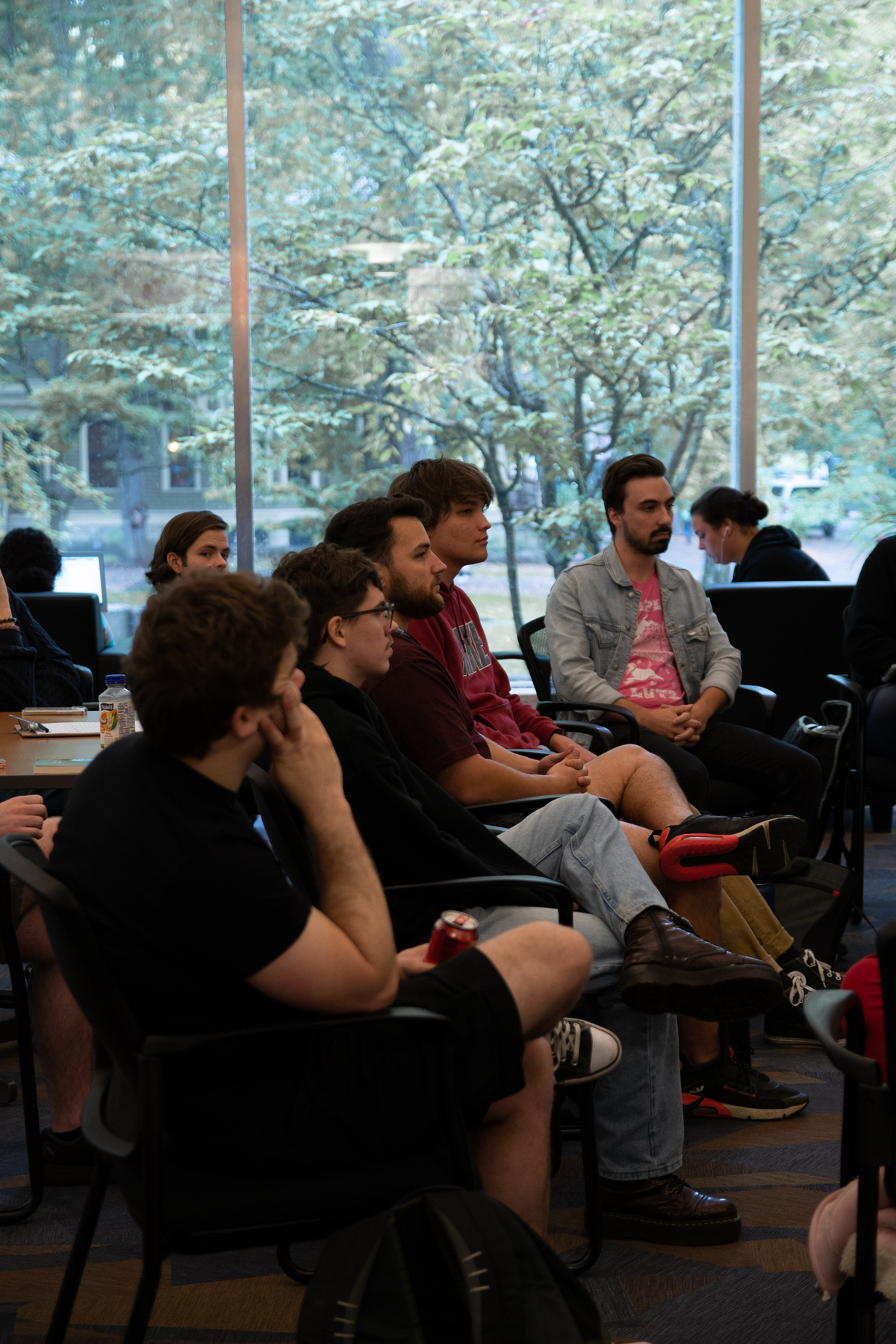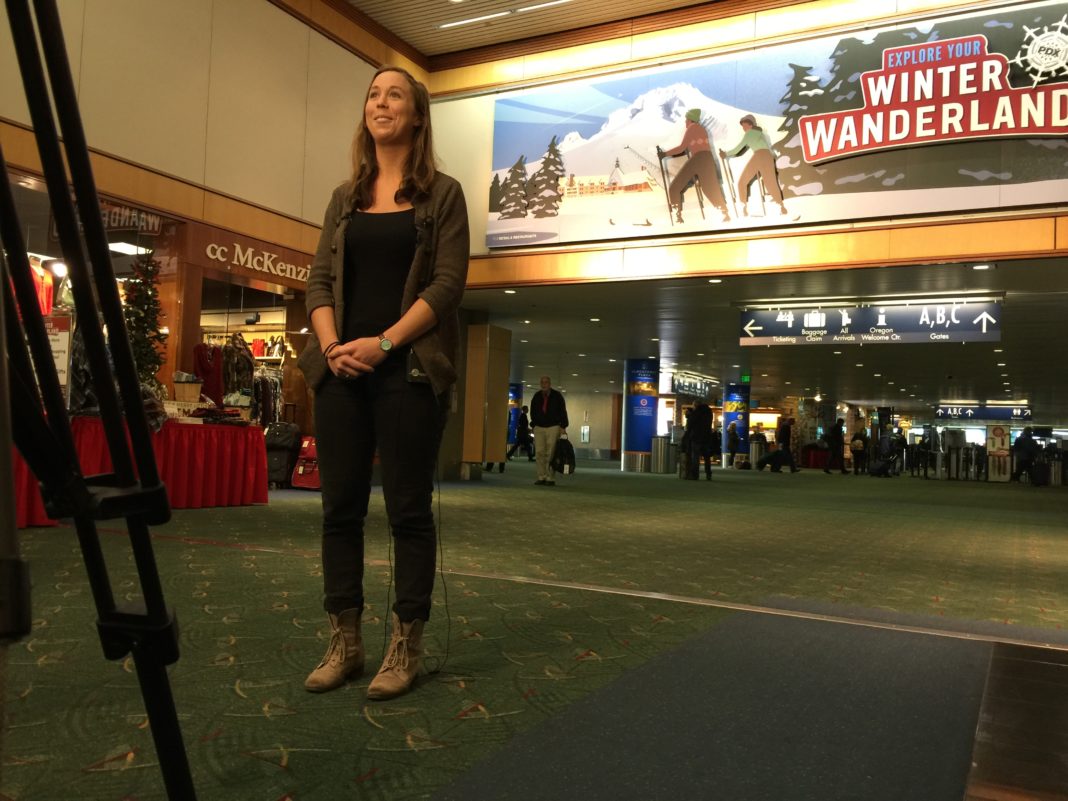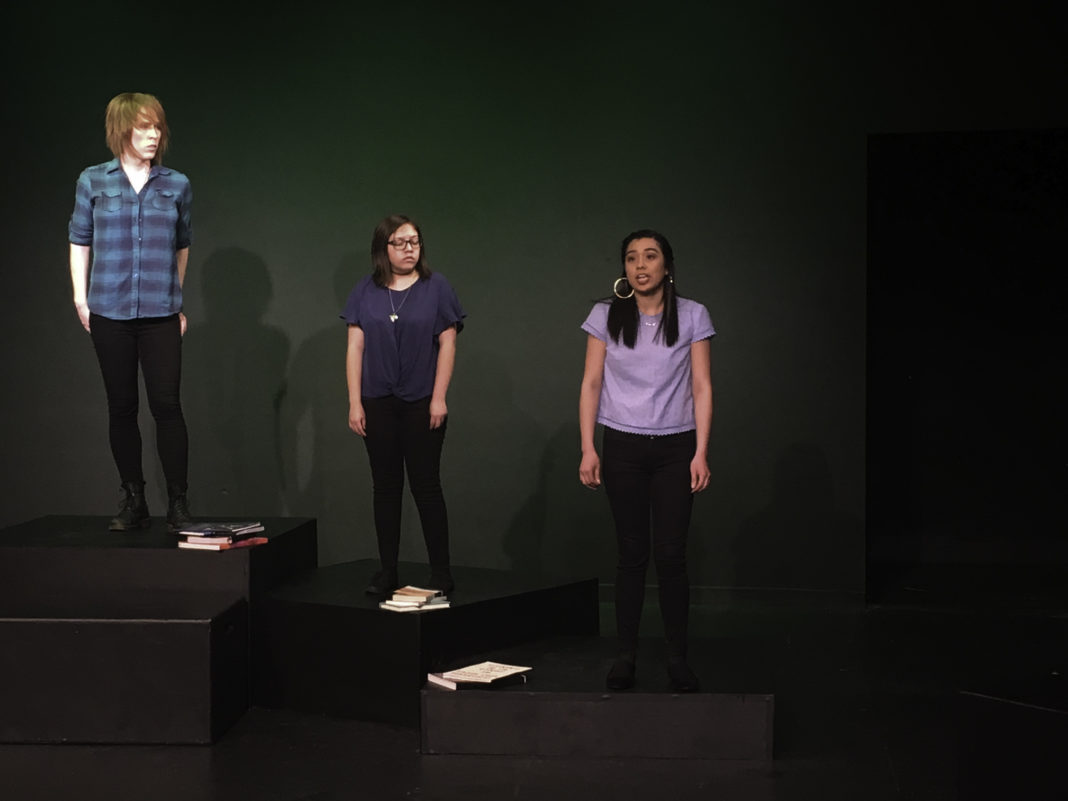As one entered the Smith Memorial Student Union second-floor lounge at noon on Wednesday, Oct. 5, they would find a curious sight. Tucked in the right-side corner of the room, abutting the Littman Gallery and the panoramic row of windows overlooking the South Park Blocks, sat a huddled group of twelve students facing a large paper sign affixed to the wall, which read “PSU Cuba Solidarity,” flanked on either side by two speakers, Stella Burlingame and Michael Chamberlain. This was the first meeting of the Cuba Solidarity Club.
Anyone who has walked through campus in the past two weeks has likely encountered one of the new student group’s bright-pink posters pinned to various bulletin boards in Smith and elsewhere. If not, they may have seen Burlingame or Chamberlain advertising the group at a folding table on the pedestrian walkway between Smith and Cramer Hall.
Burlingame and Chamberlain—the group’s founders, and president and vice-president of the club, respectively—seek to counter what they view as anti-Cuban bias by mainstream media and popular culture. The Cuba Solidarity Club, according to the founders, is an effort to organize and educate Portland State students about the true Cuba. “Really, we’re united around two things,” Chamberlain said. “One is opposition to the U.S. embargo; the second is educating and informing people about the Cuban reality. We think the U.S. public has been mis-educated.”
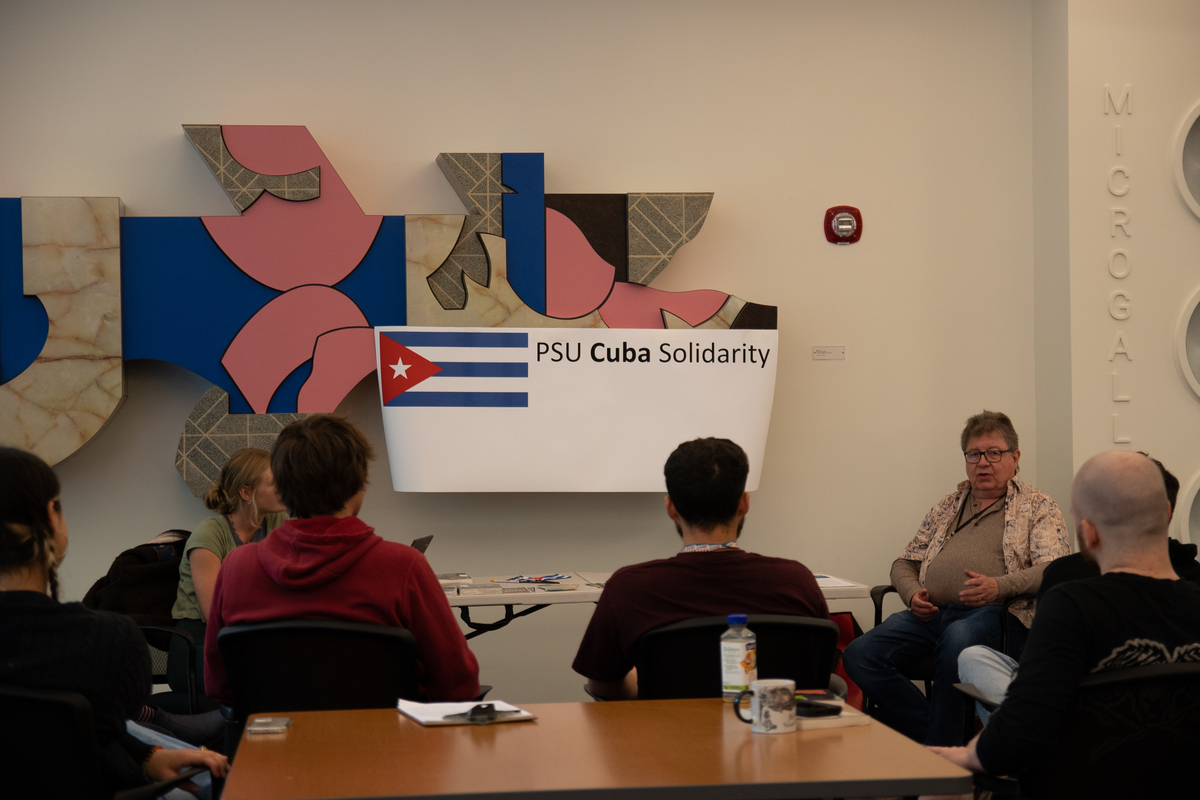
Their official mission statement is to call “on the U.S. government to lift its 60-year economic embargo—or blockade—on Cuba, and normalize relations. As a student organization, we seek to pursue this outcome through the education of ourselves and our community on the history and current reality of Cuba, inclusive of the United States’ policies of imperialist aggression toward the island nation.”
“We’ll want to do our own internal education, but we’ll also want to do a lot of outreach,” Chamberlain said regarding the club’s goals. “We want to work with other student clubs on campus who have common goals… bring speakers, [and] show support for what the city-wide group [the Portland End the Blockade Committee] is doing.”
Chamberlain spoke at length about his views on Cuba. “I’ve been active around a lot of different issues, but Cuba’s always been dear to my heart because they’ve stood up to the U.S… and there’s a lot of things [in Cuba] that I think are really admirable,” he said. In particular, he spoke about Cuba’s social safety net, including its national healthcare system and its medical brigades which travel the world to provide emergency medical aid.
Speaking on the U.S.-imposed economic embargo on Cuba enacted by the Kennedy administration, Chamberlain said, “The Cubans call it a ‘blockade,’ because it’s not just a passive unwillingness to do trade—which is what most people think of when they hear ‘embargo’—it’s really an active economic war against Cuba.”
“At the very least, the U.S. should just keep its hands off,” Chamberlain said. “Let [Cubans] determine their own future, including letting them make their own mistakes. It’s their right to make their own mistakes.”
Both Burlingame and Chamberlain have prior experience with activism. “I’ve been a social justice activist since I was in my teens,” Chamberlain said. “I was an election observer in the first all-race elections [in South Africa].”
“I actually met Nelson Mandela, I shook his hand,” he added with a smile.
Burlingame spent the summer in Nicaragua with the Asociación de Trabajadores del Campo (ATC)—in English, Association of Rural Workers. “Going to Nicaragua and attending that delegation… I met some Cuban activists, and basically the moral of the delegation was, ‘we need people that are in the belly of the beast to be doing this work in solidarity with us,’” Burlingame said.
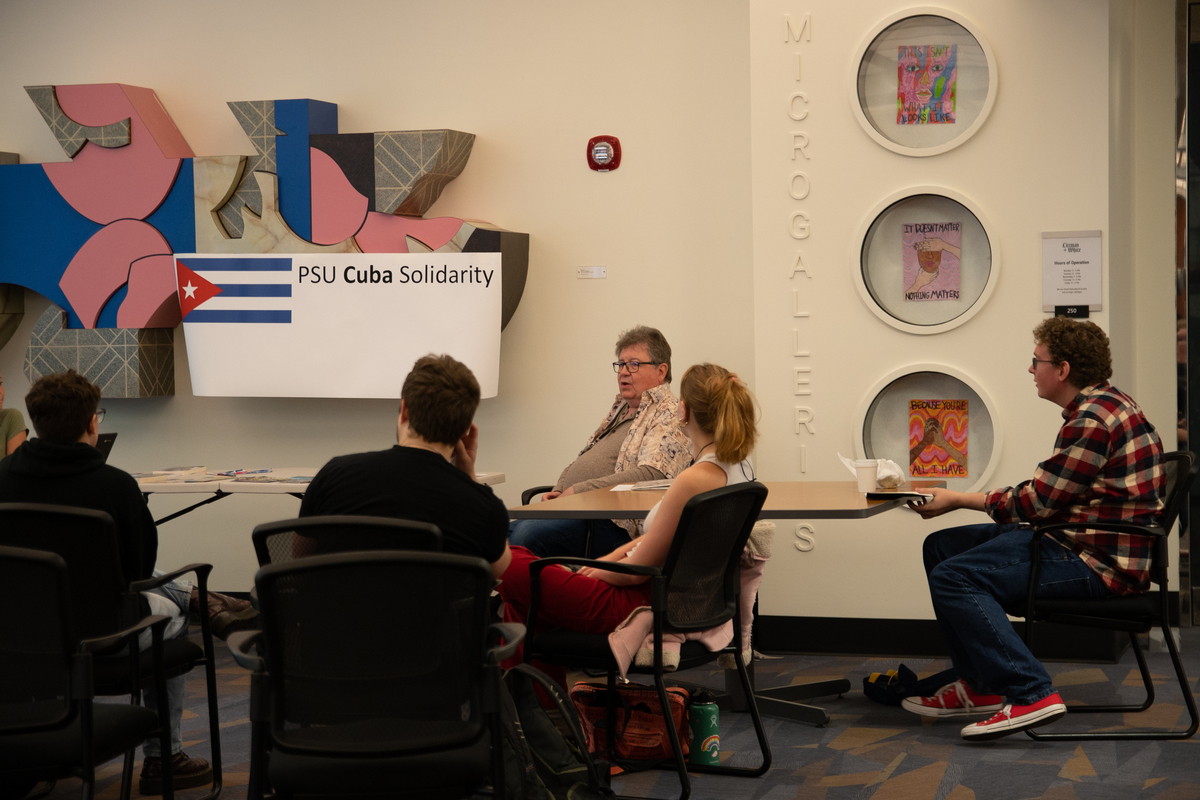
The president and vice-president met at a lecture about Cuba given by author Helen Yaffe and organized by the Portland End the Blockade Committee. Over the summer, they began to talk about forming a student group at PSU. Their first meeting about the club was at the restaurant Cubo de Cuba on Southeast Hawthorne, which Burlingame explained was a happy coincidence. “We weren’t trying to find a Cuban place… he lives in Milwaukee and I live in Northeast [Portland], so it just happened to be right in the middle,” she said.
The Cuba Solidarity Club is currently not an official student organization, as it waits for approval from Student Activities and Leadership Programs (SALP). Once the club is approved, Chamberlain explained, they plan on hosting a variety of events and activities, including guest speakers and coordination with other PSU and Portland groups. “We’re classified as an ‘advocacy group,’ I’m told, and there are other advocacy groups we’d like to talk to,” Chamberlain explained.
On Wednesday, the first meeting had a slow start, with half a dozen early attendees quietly sharing their names, majors and places of origin. As noon approached, however, the group grew larger and pulled in more chairs to fit a total of 12 students, not including the club leaders.
Spread out on a table against the wall was an array of literature on Cuba, including copies of the group’s flier; a pamphlet on “freedom of religion in Cuba;” and a variety of books such as Che Guevara Speaks, Cuba for Beginners and A History of the Cuban Revolution. Also on the table were two miniature Cuban flags and printed copies of news articles regarding Cuba.
The meeting began with introductions. The group included a wide variance of political experience, with some students being committed activists and others entering politics for the first time. There were a variety of majors as well. Some were studying political science or sociology, while others came from such disparate fields as computer science, applied linguistics, Spanish and psychology. What united them all was a shared interest in Cuba.
As the official meeting began, Burlingame and Chamberlain sometimes struggled to be heard over the din of the student lounge—the scrape of chairs, coughs and conversations which echoed through the hall often overtook the speakers’ voices. “Once we get recognized as a student group, we’ll be able to reserve an actual room,” Chamberlain said to the group.
Next on the agenda was the reading of the club’s mission statement, which was agreed to without amendments. The election of officers was a similarly short process with Burlingame and Chamberlain voted president and vice-president by a simple voice vote. After that, an attendance sheet and schedule planner was passed around the group to determine when each member was available for meetings and activities, such as tabling or poster-making. To end the meeting, Burlingame asked for each person’s contact information in order to start group communications. WhatsApp was proposed by the leaders first, however, a discussion regarding the company Meta’s ownership of the app—the same company that owns Facebook—led the group to ultimately vote to use Signal, an encrypted messaging service.
The meeting closed with a degree of uncertainty about the club’s status as an official student group. There is an unclear timeline on when SALP approval might happen, Burlingame told the group, due to the slow pace of “PSU bureaucracy.”
One student who attended the meeting, who asked to be identified as Hunter, spoke to Vanguard about their interest in Cuba and experience with the country. Before attending PSU, they were stationed in Guantanamo Bay working as an intelligence analyst for a U.S. military joint task force. The experience exposed them to regular Cuban people, they said, and highlighted the divide between U.S. perceptions of Cuba and the reality for the people there. The base at Guantanamo Bay has “a real Florida retirement home vibe,” Hunter said, a stark contrast to the world outside the base. A non-disclosure agreement they were made to sign prevented them from discussing many details about their time in Cuba, they said, but they explained how the experience had radically changed their worldview.
Moving forward, Burlingame said, “the more people who hear about what we’re doing and want to join, the better, because that’s fighting that mainstream narrative that we’re inundated with, which is that Cuba is this horrible, repressive communist dictatorship.”

